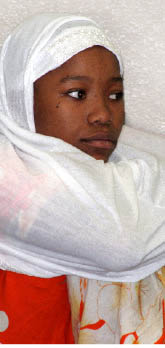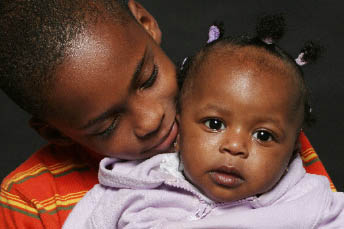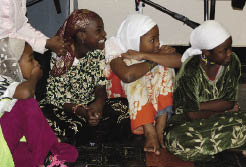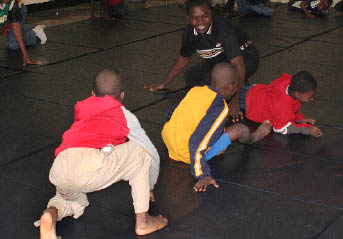Somali Star Rising
by Peter Koch

The flag of Somalia is plain: a sea of light blue with a white, five-point star in the center. The blue honors the United Nations, which was instrumental in Somalia’s independence, and the white represents peace and prosperity. The points of the star symbolize the five Somali regions that were divided by the colonial powers.
The Somali star has been falling, however, since the 1991 overthrow of President Mohamed Siad Barre ignited a brutal civil war there. The country’s infrastructure has been totally devastated, and no official government has been created to rebuild what the war has destroyed. Two severe droughts and years of war have killed more than 500,000 citizens, and at least 1.5 million (in a country of only eight million) are refugees or have been displaced.
Here in Buffalo, however, more than 1,000 Somali refugees are rebuilding their lives from the ashes of lifelong strife and civil war. Like many immigrants before them, they came here with nothing but their culture and customs, and a hope for a better life. But now, thanks to the help of resettlement agencies, local activists, their own community organizations and a collective mental toughness, their star is rising again here in the Queen City.
Resettling
There are four resettlement agencies locally helping new refugees—like the Somalis—adjust to their new home in Buffalo: Catholic Charities, the International Institute, Jewish Family Services and Journey’s End. Together they make up the Western New York Refugee and Asylee Consortium (WNYRAC), and they resettle around 1,000 refugees a year in Buffalo. Though they are on the front lines of resettlement, they are usually the behind-the-scenes people, working, for the most part, out of the community eye. They pick up new refugees from the airport, provide them with housing, clothing, transportation, money for groceries, cultural orientation, transportation and language lessons. They help new refugees access health services, schools, daycare and social services, and help them find jobs. From the beginning, they place a constant, steady hand on the shoulder of each refugee.
“A mad frenzy of activity,” is what Pam Kefi, executive director of the International Institute, calls the beginning of the resettlement process. “Refugees aren’t coming here because they’ve been dying to come to America. Other immigrants will make plans and pave the way for themselves to come, because they know this is where they’d like to move. Or they come here because they have some tie to the community, like a job or family members. But refugees come under a great amount of duress, and it’s their only option.” This usually means that refugees are ill-prepared for the rapid adjustment they have to make to their new surroundings. In the first 30 days, it’s the resettlement agency’s job to make sure that refugees are safe and knowledgeable enough to get around Buffalo. They have to be able to shop on their own, find a doctor, get their kids to school, come to English classes and get a job. They’re taught about employment culture, how to act in school and given parenting classes to adjust to the increased responsibility of parenting in a nuclear family (vs. extended family).
As she describes the process, she walks me through the magnificent, bustling Harlow C. Curtiss House, which is home to the International Institute. She introduces me to an army of people dedicated to helping refugees adjust to their new life in Buffalo. There’s the Resettlement Department, the Legal Department, the Translation and Interpreting Department, the Social Work Department and the Employment Department. Everyone who I meet is genial but brief; there’s work to be done, after all. Downstairs is where the real hustle and bustle is found, though. People of seemingly every race and ethnicity are hard at work in large semi-circles, chattering in stilted English. These are the colorful English as a Second Language (ESL) courses that run, free of charge, every morning from ten to noon.

The federal government gives resettlement agencies funding for each refugee for four months, so that’s when these agencies are most active in a refugee’s life. “There’s a community misconception that we won’t help somebody after four months, that there’s this huge gap in services,” says Kefi. “That’s just not true.” What is true is that agencies like the International Institute are always getting fresh groups of refugees, so they’re focus must be shifted to new arrivals. “We will help people out in the community when they need it, but also the goal is self-sufficiency. So we don’t do things for people, we teach them to help themselves.”
Anna Ireland is familiar with the process. As a former resettlement caseworker for Journey’s End Refugee Services, Inc., she’s helped countless Somali Bantu families to put down roots in Buffalo. “We knew that we were getting this big group of Bantus coming to Buffalo, so we really did a lot of preparation to get ready for their arrival. We knew that we were dealing with a group of people who’d never had running water, never had electricity, and who was preliterate [don’t read or write]. That’s a lot different than resettling an Iraqi family, for instance.” Some of the problems they faced, according to Ireland, were orienting the children to school, preparing the adults for employment and teaching them English. Having languished in refugee camps for more than a decade, many of the children had never been to school and had no frame of reference for it. Their parents hadn’t had work for as many years, and most of them had worked as simple laborers before that. Also, teaching English to people who could neither read or write presented its own set of challenges.
The Somali attitude helps, though. “You’re dealing with people who are survivors,” Ireland says. “They really want to start over and make a new living, and they’re willing to work hard and do whatever they’ve got to in order to make that happen. A lot of them have been through so much that the courage that you can see in their ability to start over is incredible.”
Bantu Community Organization
Abdikadir Yusuf is a vivid example of that ability to start over. Now 57 years old, he’s walked a long, arduous road from his life as an electrical engineer in Mugambo village in southern Somalia. Since 1991, he’s lost all nine of this original children, either killed or separated from him permanently, and he’s spent 14 wretched years in Kenya’s abysmal refugee camps. He came to Buffalo with little more than the clothes on his back, a knowledge of several languages and a formal education (from Italy), but that was far more than most Bantus. And that’s why he felt such a responsibility toward his people, and decided to start the Bantu Community Organization (BCO) with his wife, Rashana Saunders.
Yusuf met Saunders, a Buffalo native, on the No. 3 bus on the West Side in May 2004. Only 13 days in the States, Yusuf sat next to Saunders when he saw her in her hijab, and started speaking Swahili. “I don’t speak African,” she told him. “I speak English, I’m American.” Yusuf insisted she must be from Africa, and after several assurances to the contrary, Saunders decided to help Yusuf adjust to his new life. And the rest, she says, is history. “Once I did that, I had a whole community of people to help.”
Their fledgling organization is only about a year old and still has no funding. Yusuf has since turned it into a full-time job. Lucky for him, he was laid off from his job right around the time things started picking up at the BCO, so he can collect unemployment. It seems like small payment for the work they do there. Now he’s just worried that he can’t be everywhere all the time. Together they handle half a dozen cases a day, ranging from translation services at the DMV to helping families navigate social services to ferrying Bantus around in their family van. “Coming from a refugee camp, they’re not equipped to deal with American society. We’re too fast, so they’re falling further and further behind in everything,” Saunders says. “They don’t read or write, and learning English is tough for adults, because most of them have to work or raise young children, and can’t attend classes.” Yusuf and Saunders are slowly overcoming the growing pains of starting such an organization, but they hardly have the time to apply for grants. They only started keeping records of the services they provide four months ago.

Yusuf hands me a stack of forms filled out in Rashana’s neat handwriting. Shuffling through the pile, it occurs to me how vital the services they provide are: phone calls to Verizon for troubleshooting, calling the gas company to shut off service, mediating with the police in criminal cases, marriage counseling, translating stacks of mail for people. These services seem so simple at first glance, but would be vastly difficult for a pre-literate person who doesn’t understand or speak English. What also sticks out are the signatures of those receiving service. They are blocky and child-like, and sometimes the only legible thing is the “X” at the far left. And they are adults’ signatures.
Besides Buffalo’s 500-600 Bantus, Yusuf and Saunders also have the frequent problem of out-of-town Bantus showing up on their Riverside doorstep. “They have no home, no money, no job, no nothing. So we have to find a way to assist them, because they’ve got two and three and five and seven children,” Saunders says, laughing, “and they’re at our door with nothing and nowhere to go.” So they try to find them housing and public assistance, and the list goes on and on. “Our phone rings 24 hours a day.”
The anecdotes they tell are many. A man who was eating dog food for weeks, because he couldn’t read what he was buying at the store. A woman whose children were taken away by social services, due to a simple misunderstanding. Waking in the middle of the night to call 911 in a domestic violence case, because the wife couldn’t tell the operator what was happening. They tell these stories, shake their heads and laugh in disbelief. Clearly the responsibility is overwhelming them, and their needs are great. Above all, they need volunteers. Besides running the organization, Yusuf and Saunders also have a family to take care of. They also need donations of shoes and clothing, baby furniture and clothes, house wares and furniture, food and money. With such aid they will be able to help raise their people up even more.
Tough love
Another place where the Somali star is on the rise is at KC’s Fitness in the First Presbyterian Church on Symphony Circle. There, owner Kevin Cunningham has been working with Somali and Sudanese refugee children on an almost daily basis for two and a half years, teaching them the Japanese martial art Aikido. “It’s a very appropriate art for anyone, but particularly for young people who are at-risk, who live around things that are difficult sometimes to blend with,” he says. Cunningham is more than a teacher for children—he’s a true mentor. “As someone who grew up in a one-bedroom tenement—one of five boys—over an old jazz bar in New York City, I think I understand just a little bit of what at-risk kids go through. Also, I’m the son of Irish immigrant parents, so I have some understanding of them.”
On a recent rainy Thursday, I visited one of Kevin’s classes in the basement of the church. In a bare room with little besides tumbling mats across the floor, 10 refugee boys are in seiza at the far end of the room. This means that they’re kneeling on the floor, backs straight, hands on their thighs, eyes straight ahead, not moving a muscle. In an ideal world, that is. But these kids love the class and bring to it all the excitement and spastic energy of a litter of giddy pups. They are constantly cracking smiles, giggling and twitching and itching.
Throughout the class, Cunningham’s voice is constant and soothing. He speaks clearly in a low, calming voice, and demands the boys’ respect. He teaches them Aikido stances and moves, and he teaches them life lessons and moral values. When one boy breaks a class rule—speak English only—Cunningham gently admonishes him and corrects the problem in his way. “Why do we speak English here?” he asks the class. “So we can all understand each other.” The class is silent. “What do I think of your languages? I think your languages are beautiful. I think you should always remember your languages,” he continues. “My parents came here speaking two languages, even though it was against the law to speak their own language in the country they came from. Many people forgot. If you lose a language, you lose your culture.” He gets the entire class to agree to a punishment—50 pushups—whenever someone speaks his own language.

He moves slowly and fluidly around the room, almost deliberately as though his legs are trees that he plants with each step. He corrects this Sudanese boy’s posture, gently demonstrates the proper way to redirect and knock down an opponent on that Somali boy. He talks about ki, or life energy. He is an island of peace that transcends the chaos of what has become, by the end of class, 18 smiling, tumbling refugee boys. He closes the class with one of his mottos: “I don’t believe in something for nothing,” he tells the boys, who are gathered about him, sitting in a circle on the mats. “Don’t think you can come here without paying for it.” And each boy, in his turn, tells the rest of the group what he’s done that week to make the world a better place, to earn his time in the class.
“I think we should love children,” Cunningham says later, “but I also think we should raise the bar high. We should expect excellence from children.” Which is exactly what he does. And Buffalo’s Somali kids are certainly the better for it.
Regrowing Grant-Ferry
Bob Franke knows that the Grant-Ferry commercial district, Buffalo’s most diverse neighborhood and the home of a good portion of the Somali refugee population, needs help. What was once the a very dynamic place with small jobs and heavy pedestrian use is now “mostly rent-to-own, dollar stores, nail places and cell phone stores,” he says. The neighborhood has its roots in the Italian immigrants who once populated the area. “As that’s been changing,” Franke says, “the whole social fabric has kind of dissolved around the area. That’s why the former Forever Elmwood director has started a new organization whose goal is the revitalization of that district, the Grant-Ferry Association. And he sees the new immigrant groups—particularly the Somalis—as being vital to the effort.

The Grant-Ferry Association is an all-volunteer group that’s organized around work groups. “We made sure not to call ’em committees, because we’ve got to get something done here before I get too old,” Franke says, laughing. The work groups include the streetscape work group, whose job is beautification; the business recruitment work group, whose goal is to bring new business; the community events work group, who looks for festivals and events to celebrate the community and instill a sense of ownership in the residents; and the quality of life work group, which deals with crime and safety, and establishing block clubs.
Franke is excited by the diversity of the neighborhood, which includes Somalis, Sudanese, Vietnamese, Burmese, Puerto Ricans, Mexicans, Italians, Albanians and Russians, among many others. He says that the area once found its base in the immigrant entrepreneurial imagination, and he think that Grant-Ferry could build that base again. He also understands, though, that the retail business world is much more complicated to navigate now than it was in the 1920s and 1930s. So his association is trying to start retail business incubators, a unique idea that gives entrepreneurs a building to start in with little or no rent, basic infrastructure and start-up money. Once the business grows enough and takes on its own life, it could easily move to a new building, making room for more new businesses. He hopes to enlist the help of Buffalo State’s Small Business Development Center, as well the business program at Canisius College, for technical support.
As examples of emerging success stories, Franke mentions the Somali Star restaurant on Grant Street between Ferry and Lafayette, and two Somali-owned markets farther north on Grant. He says that he particularly likes the Somalis, because of their spirit and unflappability. What he doesn’t mention is that Somalis are legendary businesspeople. During the worst days of the civil war in Somalia, when the government and all its infrastructure collapsed, entrepreneurs were said to have turned a profit by opening their own hospitals, schools, telephone companies, ports and power plants.
Here on Grant Street, Ahmed Hassan’s Somali Star is still only turning a modest profit, enough for his family to get along. The bright yellow takeout stand of a restaurant has only a modest menu that includes traditional foods like sambosa, goat curry, fried dough and basmati rice. The seating is all outdoors, mostly old plastic yard furniture—two tables and 10 or so chairs. But the Somali Star is a friendly place, and it is international. A few weeks ago, I sat at a table with three African men, eating goat curry and sipping a sweet Somali tea. One of the men, a Sudanese refugee, began to tell me his story. How he was a minister in his country’s cabinet, how he fled the country during a violent coup, how he eventually came to Buffalo, how his star, too, is rising with each new opportunity afforded him here.
Bantu Community Organization
57 Humphrey Rd
Buffalo, NY 14207
bantubwana@yahoo.com
716-603-4848
716-602-5265
|
Issue Navigation> Issue Index > v5n41: Meet the Governor (10/12/06) > Somali Star Rising This Week's Issue • Artvoice Daily • Artvoice TV • Events Calendar • Classifieds |









 Current Issue
Current Issue